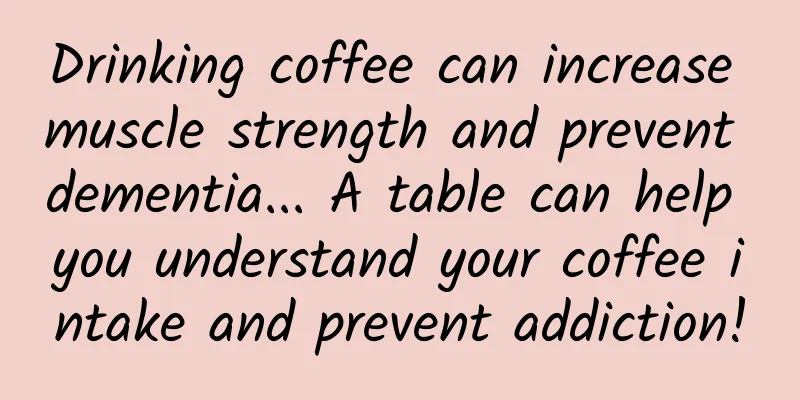Drinking coffee can increase muscle strength and prevent dementia... A table can help you understand your coffee intake and prevent addiction!

|
The popularity of coffee culture has also led to a new coffee food trend! Many people need a cup of coffee every day, and even supermarkets and coffee chain stores offer buy one get one free and 30% off the second cup to promote sales. Most people may not know that not everyone can drink coffee, or even understand the pros and cons of coffee. If they blindly follow the trend and drink coffee but develop health problems, the result will not be worth it. Breastfeeding mothers should stop drinking caffeinated coffee Nutritionist You Weiming mentioned that for most people, a small amount of caffeine will not cause health concerns, but excessive intake will cause insomnia, headaches, abnormal heart rhythm, irritability and anxiety. It is especially dangerous for patients with mental illnesses such as restlessness, insomnia, depression, etc. However, if a healthy person is extremely sensitive to caffeine, the above-mentioned adverse symptoms may occur even if the amount consumed is very low. For women who are preparing to become pregnant or are already pregnant, excessive caffeine intake may increase the risk of miscarriage and low birth weight. Especially for breastfeeding mothers, if their babies become irritable after drinking caffeinated beverages such as coffee and tea, they need to stop drinking caffeinated beverages. In addition, excessive caffeine intake by children may also experience negative health effects such as bedwetting and dullness. Beware of coffee addiction! Caffeine withdrawal symptoms such as fatigue, headache, and irritability It may be difficult for us to imagine that hundreds of billions of cups of coffee are consumed every year. This staggering number is not only about the benefits of consumption, but more importantly, whether coffee causes addiction! ? Nutritionist You Weiming pointed out that people who drink coffee for a long time will start to experience caffeine withdrawal symptoms such as fatigue, headache, irritability, and anger 24 hours after stopping drinking coffee. The symptoms are more obvious in people with higher caffeine intake. Surprisingly, after drinking coffee, the symptoms are completely relieved within 60 minutes. Our dependence and addiction to caffeine deserves more attention from the public. Study: Drinking coffee can help prevent dementia and increase muscle strength Coffee is like a double-edged sword. If used properly, it can still have valuable health benefits. Nutritionist You Weiming said that many studies have found that there are many plant chemicals in coffee that have good effects on the nervous system, physiological metabolism, muscle activity, and health. For example, drinking a moderate amount of coffee every day can reduce the risk of Parkinson's disease and Alzheimer's disease. It may be that the chemicals in coffee activate the body's enzymes to fight free radicals, thereby enhancing the body's protective mechanism for nerves. Sports research has also found that caffeine may help improve athletic performance. It is speculated that caffeine increases cells' utilization of calcium ions, thereby strengthening muscle contraction and increasing muscle tissue strength. However, people who do not drink coffee often may be at risk of a sudden increase in blood pressure. Nutritionist You Weiming reminds us that although drinking coffee can help boost our spirits, improve our attention and concentration, not everyone can drink it as much as they want. People must drink it in moderation to get the health benefits of coffee. The following is a table of caffeine intake limits for different groups set by the Canadian Health Department: The Ministry of Health and Welfare recommends that the daily caffeine intake per person should not exceed 300 mg. At the same time, for packaged beverages containing caffeine, the caffeine content should be indicated on the outer packaging of individual products: (1) For beverages containing 20 mg or more of caffeine per 100 ml, the caffeine content shall be indicated in milligrams of caffeine per 100 ml. (2) If the caffeine content per 100 ml is less than 20 mg, it shall be labeled as "20 mg/100 ml or less". (3) For products containing 2 mg or less caffeine per 100 ml, the term “low caffeine” may be substituted for the term “20 mg/100 ml or less”. Registered chain beverage stores, convenience store chains, and fast food chain operators that sell coffee drinks prepared on site should display red, yellow, and green symbols or patterns in a conspicuous place at the sales location to distinguish the caffeine content: (1) Red indicates a total caffeine content of 201 mg or more per cup. (2) Yellow represents a total caffeine content of 101 mg to 200 mg per cup. (3) Green means the total caffeine content per cup is less than 100 mg. |
<<: Eating while standing or sitting, could posture affect satiety?
Recommend
Experts introduce the prevention methods of vulvar leukoplakia
The methods of preventing vulvar leukoplakia have...
What are the hazards of common cervical precancerous lesions?
What harm will women suffer from cervicitis? Most...
What are the symptoms of early uterine fibroids? Can uterine fibroids cause vaginal bleeding?
The incidence of cervical fibroids is very high, ...
What is uterine fibroid bleeding? Symptoms of uterine fibroid bleeding
What is uterine fibroid bleeding? - Learn about t...
Depressed women are more likely to develop uterine fibroids
Many female friends do not know enough about uter...
How to treat primary amenorrhea
The treatment of primary amenorrhea depends mainl...
What are the common causes of cervical erosion in women? Top ten causes of cervical erosion
Cervical erosion is a disease that many female fr...
Zhang Huimei's 4 secrets to lose weight and redeem herself from the fat
Singer A-mei Chang will serve as a mentor for Zhe...
The most common symptoms of vulvar leukoplakia in female friends
Among gynecological diseases, vulvar leukoplakia ...
What are the dangers of spontaneous abortion?
Spontaneous abortion refers to the cessation of d...
Getting up early and doing 12 yoga moves can help your metabolism and lose weight quickly
Morning exercise is a habit of many people. The a...
Oil-cutting weight loss pills are popular, be careful with the display, it's easy to confuse
In order to lose weight, many people are accustom...
How to do daily care for patients with pelvic peritonitis
We should pay attention to the disease of pelvic ...
Bartholin's gland cyst during pregnancy
Treatments for Bartholin's gland cysts during...
What are the common causes of uterine fibroids?
Uterine fibroids are benign tumors that occur in ...









